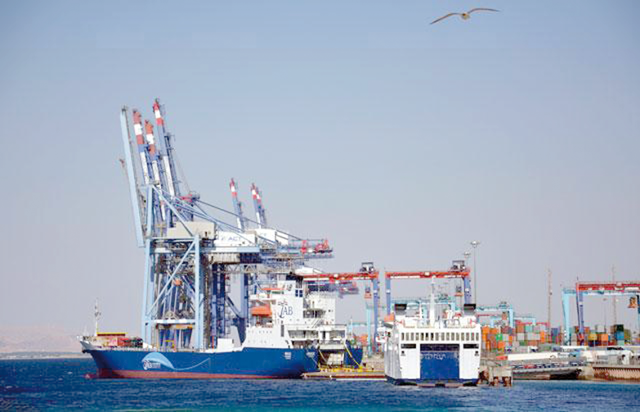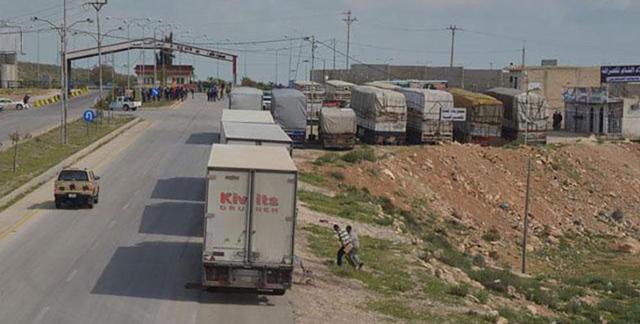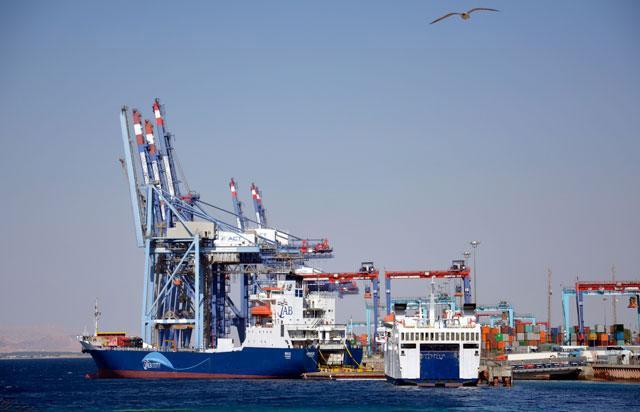You are here
Aqaba port truck traffic resumes
By Mays Ibrahim Mustafa - Dec 17,2022 - Last updated at Dec 17,2022

The loading of containers and several types of cargo, including livestock, food and other items, is ongoing and gradually returning to normal levels at the Aqaba port, a government official told the The Jordan Times (File photo)
AMMAN — The loading of containers and several types of cargo, including livestock, food and other items, is ongoing and gradually returning to normal levels at the Aqaba port, a government official told The Jordan Times.
The official, who preferred anonymity, said that 18,000 trucks did not join the strike, and they were prevented from working by those who took part in the strike.
Truck traffic to and from the Aqaba port has also resumed, according to the Association of Owners of Clearance and Transport Companies.
The port’s container occupancy rate decreased from 80 to 74.1 per cent over the past four days, said association president Deifallah Abu Aqouleh.
On Wednesday, over 13,000 containers were congested at the port, 536 of which were refrigerating containers with high storage and operational costs, he told The Jordan Times, noting that this has “caused major economic loses in various sectors”.
Abu Aqouleh said that the congestion was caused by truckers’ strike which began two weeks ago.
Through Friday, around 800 containers left from Aqaba to various governorates, he added, estimating that the current number of containers at the port currently measures 12,000.
Before the strike, trucks loaded over 1,000 containers on a daily basis, according to Abu Aqouleh.
Ahmad Abu Judeh, a local trucker in Zarqa, urged the government to reduce fuel prices.
He noted that diesel costs take up over 75 per cent of his income.
“It costs me JD430 to transport goods from Zarqa to Aqaba and vice versa. In such a trip, my remaining profit is JD80 to JD100,” Abu Judeh told The Jordan Times, adding that there are other operational costs involved in loading and unloading goods.
“I also pay around JD550 per year for licensing and insurance and other regular maintenance costs,” he continued.
In an interview with The Jordan Times, Jordanian economist Husam Ayesh noted that the transport sector consumes 58 to 60 per cent of the world’s oil.
He also noted that oil derivatives account for around 25 to 30 per cent of the operating costs of the various means of public transport in Jordan.
Moreover, diesel makes up 60 to 70 per cent of the operating costs of trucks, which means that “any slight increase in prices has a noticeable impact on the overall profits and costs afforded by truckers”.
Fuel prices have increased by around 30 per cent since the beginning of the year, despite the global decline in oil prices, according to Ayesh.
He stressed the importance of lowering the “high” taxes imposed on oil derivatives in order to reduce the financial burden on citizens and economic sectors.
Related Articles
AMMAN — Truck movement from Jordan to Syria has risen by more than 850 per cent this year compared with previous years, according to the Ass
AMMAN — The clearance and transport companies operating in the Kingdom completed 784,000 customs declarations during 2021 compared with 683,
AMMAN — The Jordan Chamber of Commerce (JCC) is coordinating with the government to help resolve the issue of trucks stalled at the Al Batha


















